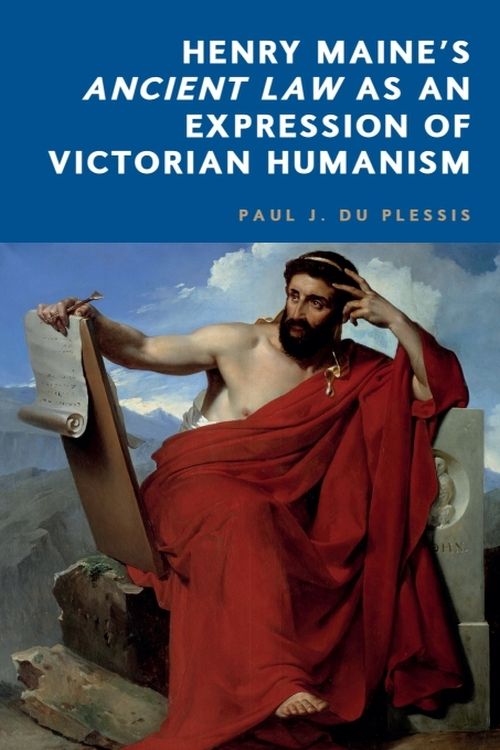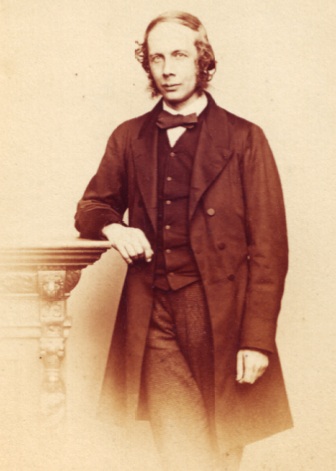
by Paul du Plessis

Examines the contexts and purpose of Henry Maine’s Ancient Law by focusing on the sources he used to write it.
Want to read more? You can ask your local library to order it! Click the button and select the option underneath the cover.
Tell us about your book!
Henry Maine’s book, Ancient Law, remains one of the most influential legal treatises of the late nineteenth century. It has deeply shaped various academic disciplines such as legal history, sociology of law and legal anthropology. However, despite—or perhaps because of—its widespread impact, Maine’s intellectual legacy has begun to overshadow the actual content of his work. My monograph aims to revisit the book, analysing its structure and arguments, with the central question: what did Maine believe he was doing when he wrote Ancient Law?
To answer this question, this monograph employs a twofold approach. First, it links Ancient Law directly to Maine’s training at Cambridge as a classics scholar. During the early nineteenth century, when Maine was a student, the discipline was influenced by several works, including those by Edward Gibbon and Georg Niebuhr. Maine’s inspiration for his work can be traced to these sources and the themes developed within them. Both Gibbon and Niebuhr emphasised studying ancient law as a form of historical enquiry. They also used comparative references to support their theories. This monograph argues that Maine adopted both their methodology, as far as it was applicable, and their tendency for comparison from these two works to develop Ancient Law.

Secondly, this monograph examines the book as a narrative structure. Ancient Law is intentionally designed. It represents a refined piece of narrative prose in the style of European Humanism, crafted to engage with critical geopolitical issues of the late nineteenth century, in keeping with this intellectual tradition. Therefore, the reference to Gibbon and Niebuhr highlights not only Maine’s education but also his intention with Ancient Law. The fundamental goal of Humanist scholarship is to speak truth to power in a subtle manner. Maine employs this approach in his book. Although, on the surface, the book appears to be a history of the development of law in the ancient world, the themes within it create a dialogue with contemporary issues in English society during the mid-nineteenth century, such as Law and Empire.
Maine’s book can be divided into two main parts: the first (chapters 1–5) offers a justification for focusing on ancient law and explains his method, while the second (chapters 6–10) presents several case studies where Maine tests his hypothesis. Maine’s method is complex. Although chapter 5 includes a methodological discussion, it is mixed with many other topics, making it difficult to discern. The book concentrates on Roman law and its historical evolution. He regarded Roman law, the focus of his chair at Cambridge, as the prime example of a historical legal system. Therefore, an analysis of how Roman law responded to social change can be used to make broader points, through a Humanist lens, also relating to English law and Hindu law. Throughout the book, Maine’s emphasis remains firmly on Roman law. Using insights from this legal system, he suggests that a legal system develops internal mechanisms to respond to social change. These mechanisms, and their manifestations across different areas of Roman law, form the core part of his book.
What inspired you to research this area?
Maine’s book has always appealed to me. When I first read it, I found it quite strange, especially the absence of any discernible references. I also found the prose to be quite tricky. Having read the book at the start of my career, I have long meant to return to it. Working on this project has certainly altered my perception of my discipline. I have come to appreciate the extent to which we still inhabit the intellectual ruins of the nineteenth century and its attendant anxieties.
What was the most exciting thing about this project for you?
Working with a book that has such a great legacy is challenging. Many scholars have specific opinions about Maine and his work. I hope I have represented them well. One of the great mysteries about Maine’s book is that there is no manuscript of it. This is not uncommon, since manuscripts were often destroyed in production during the Victorian period. Nonetheless, since some of his notebooks are still extant, and since his archive is incomplete, there is a chance that we may still stumble upon his notes or even a manuscript of the work. When this happens, I guess a second, revised edition will be needed.
What’s next for you?
Having finished the project on Maine, I have begun a related project on the extent to which Roman law responded to social changes using several case studies.
About the author

Paul J. du Plessis holds the Chair of Roman Law at the University of Edinburgh. As a legal historian, he delves into the intricate links between law and society throughout history.






